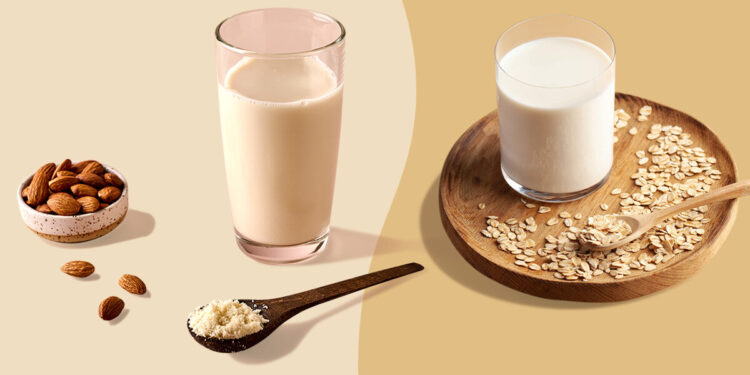Oat Milk vs. Almond Milk: Which Is Healthier?
Traditionally in the U.S., “milk” has referred to the jug of dairy milk in the refrigerator section of the grocery store. But over the last decade, the way we define milk has changed, and plant-based milks have grown exponentially in both popularity and in quantity over the last few years.
There are countless choices, including soy, almond, coconut, oat, rice, hemp, pistachio and cashew, just to name a few. These plant-based milk alternatives are also utilized to create a variety of different creamers—unflavored, flavored, unsweetened, sweetened and fortified with a variety of vitamins, minerals and nutrients.
The type of plant used as the base to create each milk, as well as any other added ingredients, can greatly impact the nutrition of these products. Not all milks are the same, and even the same kinds of milk can vary from brand to brand. Here we consult with registered dietitians, Shayna Komar, RD, and Carolyn Williams, Ph.D., RD, and compare two popular types of plant milk: oat milk and almond milk.
Oat Milk and Almond Milk vs. Dairy Milk
Both oats and almonds have been a part of the human diet for centuries. They are dairy-free and suitable for individuals who are lactose-intolerant, have dairy allergies or simply want to cut back on the amount of animal products they consume. Further, plant-based milks, including oat milk and almond milk, have been associated with a positive impact on cardiovascular health in some research.
In the simplest terms, plant-based milks like oat milk and almond milk are made when the plant is soaked in water, ground fine and strained to create a liquid that retains the flavor and some of the nutritional attributes of the original plant. To improve stability, consistency and taste, any number of oils, thickeners, stabilizers or sugars may be added to the finished product as well.
Neither oat milk nor almond milk naturally provides the amount of calcium and protein that’s found in dairy milk. However, both plant-based milk options have no saturated fat, compared to whole dairy milk which has about 4 grams in 1 cup. Additionally, many varieties of plant-based milks are fortified with calcium, vitamin D, plant-based protein and other vitamins and minerals.










